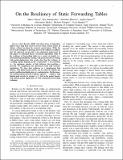On the Resiliency of Static Forwarding Tables
Author(s)
Chiesa, Marco; Nikolaevskiy, Ilya; Mitrovic, Slobodan; Gurtov, Andrei; Madry, Aleksander; Schapira, Michael; Shenker, Scott; ... Show more Show less
DownloadAccepted version (1.669Mb)
Terms of use
Metadata
Show full item recordAbstract
© 1993-2012 IEEE. Fast reroute and other forms of immediate failover have long been used to recover from certain classes of failures without invoking the network control plane. While the set of such techniques is growing, the level of resiliency to failures that this approach can provide is not adequately understood. In this paper, we embarked upon a systematic algorithmic study of the resiliency of forwarding tables in a variety of models (i.e., deterministic/probabilistic routing, with packet-header-rewriting, with packet-duplication). Our results show that the resiliency of a routing scheme depends on the 'connectivity' k of a network, i.e., the minimum number of link deletions that partition a network. We complement our theoretical result with extensive simulations. We show that resiliency to four simultaneous link failures, with limited path stretch, can be achieved without any packet modification/duplication or randomization. Furthermore, our routing schemes provide resiliency against k-1 failures, with limited path stretch, by storing (k) bits in the packet header, with limited packet duplication, or with randomized forwarding technique.
Date issued
2017Department
Massachusetts Institute of Technology. Department of Electrical Engineering and Computer Science; Massachusetts Institute of Technology. Computer Science and Artificial Intelligence LaboratoryJournal
Networking, IEEE-ACM Transactions on
Publisher
Institute of Electrical and Electronics Engineers (IEEE)